Captain Nihilist asks, “What’s so bad about calling them ‘webcomics’?”
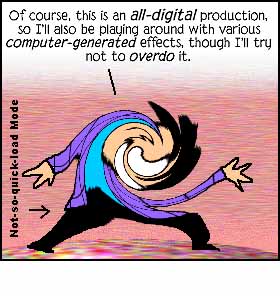
I’m probably going to end up making an issue out of a non-issue here, but the topic is fairly interesting and, as more independent artists migrate to the web, is probably going to get more press in the coming years. Comic creators are, after all, totally anal when it comes to proper terminology.
Should we still keep calling comics on the web “webcomics”?
A few bloggers have brought up that they just do not like the term.
AT ALL.
I’m speaking to YOU, Mike Perridge.
Mike (codename: MPD57) displays the following motto on the banner of his blog:
Webcomics don’t even exist as far as I’m concerned. Comics remain comics whether in print or online. Each medium presents it’s [sic] own opportunities and challenges but comics remained untouched at the centre.
Big words, MPD57. Let’s not forget that MPD57 is British, and his countrymen call sausages “bangers” and cigarettes “a politically incorrect slur about homosexuals.” If we let the British come up with an alternative term for webcomics, no doubt they’ll come up with the name of a heinous sex act and pass it off as some cultural quirk. Wouldn’t that be the dog’s bollocks!
Clearly I have a personal stake in the debate, since my site is called “The Webcomic Overlook” and I don’t want to lose the $15 I spent registering the web address. But I also think it’s a good term, and we should stop worrying and learn to love “webcomics.”
Why it’s OK to love the name:
1.) The alternatives aren’t actually better.
Take the terms “digital comic” and “online comic.” It has a nice sound to it, admittedly. However, how in the world is this any better than just saying “webcomic”? The latter term is two syllables less. And we know that no one likes to say the longer word when a shorter one exists. Do people go around saying, “I’m gonna borrow the automobile”?
The only redeeming merit is that those terms do separate “comic” and identify it as part of a family. This would be analogous to how vertically challenged people prefer to be called “little people” rather than “midgets” or “dwarves”: the “people” at the end means that, above all, they’re still human and deserve the same respect.
However, doesn’t “webcomics” already have “comics” tagged at the end? I mean, it’s not like you’re going to click on a link and arrive at a photo gallery of little people (provided that the site owner was being forthcoming).
If it really bugs you, you can always call them “web comics.” See? Problem solved with the inclusion of a tiny space.
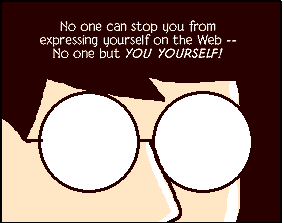
2.) The traditional terms don’t work too well either.
I mean, why get your panties in a bunch when comic professionals have been drenched in flop sweat over what to call their pages and pages of pretty pictures?
- Comics – It shares the name with comedy. You won’t believe how disappointed I am when Comedy Central airs “Last Comic Standing.” They even use a word balloon as a logo, for God’s sake!
In addition, there are people who read print comics who pooh-pooh the term. The connotation is that, despite all the “comics aren’t just for kids anymore” articles, people think that comics are still just for kids. That’s a little inaccurate: the public sentiment is that comics are for man children who really need to grow up.
STILL, despite its shortcomings, “comic” is still the widely accepted term, holding court over all other pretenders to the Nomenclature Throne.
- Graphic novels – The term was popularized by none other than Will Eisner himself (though he didn’t invent it). I’m sure this started out as a way to legitimize the comic industry. However, “graphic novel” reeks of pretentiousness. It always reminds me of that MST3K skit where Tom Servo (played by Kevin Murphy) huffily retorts “It’s a graphic novel!” every time Joel says “comic.” I’ll let Alan Moore explain:
It’s a marketing term … that I never had any sympathy with. The term ‘comic’ does just as well for me. … The problem is that ‘graphic novel’ just came to mean ‘expensive comic book’ and so what you’d get is people like DC Comics or Marvel comics — because ‘graphic novels’ were getting some attention, they’d stick six issues of whatever worthless piece of crap they happened to be publishing lately under a glossy cover and call it The She-Hulk Graphic Novel….
- Funnies – not only does it fall prey to the whole issue with “comics,” it also sounds terribly archaic. Does anyone still call them “the funny pages” anymore? I thought we were calling them the comics section.
- Sequential Art – no one knows what the hell this means. Seriously. Say you talked to someone on the street an you said, “I’m reading this great ‘sequential art.'” That person is going to say, “What?” And you’ll be forced to say, “Uh, I mean a comic.” You could’ve saved yourself a pointless side conversation!
3.) There actually IS a difference between webcomics and print comics nowadays.
Taking MPD57’s original statement, it would also be wrong to refer to books on tape as “audiobooks” and online journal entries as “blogs.” After all, what’s the difference … other than the medium? Because it’s handy. And you get a better idea of the product that’s being delivered to you. I don’t want to be saying things like “this comic I read on the Internet” all the time.
Remember, brevity is the soul of wit.
I have no idea what the statement means in context to my discussion about “webcomics,” but I think Shakespeare said it and that guy was the bomb-diggidy.
Now, there are claims that “webcomic” sort of denigrates the product, as if it was something not up to par with “comics.” Where would you get that impression? Frankly, I don’t think webcomics have ANY sort of reputation yet! Mention it to someone, and they’ll probably say, “I’ve never read webcomics before! What would you recommend?”
If you get, “Webcomics are for babies and man babies and I don’t want anything to do with them,” likely they already hated comics anyway, so you wouldn’t have won any prestige points for changing up the term.
Now, if “webcomics” eventually become strongly equated with demeaning qualities (like “midgets”), I can see the need to boost marketing value with a name change… but that’s the perils with using any term, now, wouldn’t it?
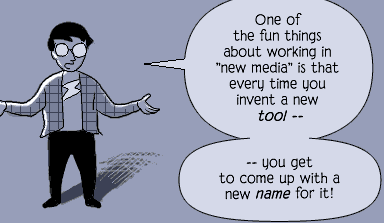
4.) Sometimes you have to roll with what everyone’s calling it or you’re going to end up looking like a pompous fool.
Seriously. I wasn’t to happy when everyone started calling it “email”, but that name totally stuck. If I started calling it “online mail,” I will get dirty glances, a raspberry, and possibly everyone sending my online mail address to spammers. I also wasn’t too thrilled with “spam,” but there you go.
In closing, can we all agree that “webcomickers” is a terrible term? Who coined this? I mean, do you call print comic creators, writers, and artists “comickers”?
No, of course not.
Because it’s STUPID.
* – Images from I Can’t Stop Thinking, Scott McCloud.
Posted on July 22, 2009, in The Webcomic Overlook, webcomics. Bookmark the permalink. 81 Comments.



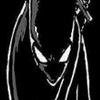


































































































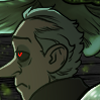





Well written — I agree. “Comics” is the established expression for stories told with pictures, and thus there’s nothing wrong in calling them webcomics. Or web comics, digital comics or online comics. Personally I often just refer to them as “comics” — often there’s no need to specify that they’re on the web at all.
An interesting side note: in my language (Norwegian), our word for comics, “teikneseriar”, doesn’t share it’s name with comedy at all. It literally means “drawn sequences” (even though photo comics are included in the definition).
And I’m stealing this topic for my blog tomorrow.
Thanks for the comment! And go ahead and steal the topic — you might have a far better perspective from an international sense. 🙂
There’s only one thing worse than being talked about … but I don’t know what that is. Your whole argument is flawed but I’m not telling you why because you wouldn’t understand – how’s that for pomposity?
Knew I should have changed that header like I planned yesterday – damn!
Hi !
i like you
I agree that webcomics have earned a decidedly negative connotation, but at the same time it’s a fitting term to use. Anyone who doesn’t like the connotation that goes with them is probably just complaining. A new name would acquire the same connotations in short order, so perhaps it isn’t the term but rather the industry that needs a change.
The biggest problem I have with webcomics is sifting through the terribly uninspired cruft and getting to the well-thought, well-written, well-drawn webcomics. They’re out there, but without some sort of centralized ‘rating’ that’s trustworthy, they still end up piled in together. Realistically, good media is less common than bad media, and generalizations are based on averages, so I really COULD say that ‘webcomics are terrible, badly drawn pieces of work from illiterate people with too much time on their hands’.
This is my first time visiting this site though, and it looks like you just might be that centralized review site. Consider me a new subscriber.
Great post, sir.
In Mexico, webcomics are starting to get more popular by the day. And although they are designed to be published exclusively on the web, some authors choose to publish it online and, when possible, print a collection of the best strips and/or stories for people who like comics as an object too. So even when it’s the same thing, I think there is a difference in using the specific term “WEBcomics”. It simply states that it’s being published online.
Oh! Great avatar. You are aware that’s Blue Demon and not El Santo, right?
Woo! Someone finally called me out on the mask!
It’s true. That’s the Blue Demon. Thing is I’d been going by the “El Santo” handle for a while. I just happened to have the “Blue Demon” mask because I was planning it to wear to football games (blue is one of the team colors). Didn’t want to go through another name change; didn’t want to have to get a new mask; there you go. (Also, I just happen to think Blue Demon’s mask is cooler than El Santo’s.)
I equate it to MF Doom using Dr. Doom’s name, but wearing a mask from Gladiator. 🙂
If webcomics have a negative connotation, it’s because there are no quality controls on them, like blogs, which have a predominant association with whiny teenagers writing about the stupid details of their lives.
I personally don’t see any problem with the term, but at the same time most webcomics are done in a print format instead of, say, taking advantage of software like Flash, so the term ‘comic’ seems equally valid.
I’d say it’s more the UBER LEVELS OF GEEKINESS that makes even guys who collected every issue of Spawn cringe that gives it it’s bad vibe.
It’s like being at an endless virtual Comic Con where everyone is doing Harry Knowles cosplay.
This post made my day. Honestly, this is such a ridiculous thing for you to be having to discuss! I can’t believe there are folks who even care what we call comics (okay, yeah I can, actually). As a person who reads both print and online comics, it never occurred to me that the term “webcomic” would ever hold a negative connotation. That is, what they are, right? Comics on the web? Jeezburger.
lol vertically challenged people 😀
good read.
I will propose here that we come up with a new term for all comics published on the web………”Ranklets”
I think of WebComics as more of the multi-panel serial comic found on the “web” as opposed to newspapers. I’m not sure there is anything wrong with that. I still use the webcomic term on my site just for the potential keyword hit although mine are single panel comics.
Any alternative to “graphic novel” is fine by me.
Speaking personally, to me, “webcomics” is “the scene: juvenile, mediocre, micro-celebrity-driven, where leading people claim to be making a living from their work but rely on scams and hustles to get by, all while letting gullible fanboys kiss their ring.
Those of us who have joined the exodus from the scene are a little touchy about being included in its midst because we’re making better, more professionally validated comics, and we are doing it as cartoonists, not as another online quagmire of logrolling and backscratching.
I spent a lot of time and energy in webcomics, and encountered a lot of schoolyard attitudes, boorish behavior and dismal work. Webcomics had its chance to make room for my work, but it hung like a weight around my neck with its stigmata, and I left. I hope it grows up, but I am very pessimistic for its future. By contrast, I am very optimistic for the future of comics online, and I don’t care what they are called. I call them comics myself, but as long as I people are aware of my record as a critic of webcomics and their failures, I’d hardly demand an alternate name for my own work. I suspect as the differences between those of us who reject the scene and those who embrace it become more apparent, better terminology will evolve. If you must, divide us between the scenesters and the independents. Besides my own work, prominent titles that tilt heavily indy include Toothpaste for Dinner, Sinfest and Subnormality.
For the record, I don’t consider Webcomics Overlook enmeshed in the scene in the same way as, say, PvP. The essential differences are your conduct and the quality of your work. There is also the matter that you bring coverage to deserving comics that are, perhaps naively, involved with the scene until they mature. The work you do is important.
I note that you have received a share of frankly shallow comments. Perhaps some were merely hasty, but they represent the level of routine discourse I left behind when I realized I had outgrown the scene and was leaving it behind. It’s just another reminder of how the scene drags down a serious approach to creating comics, perpetuating its lackluster features.
Good post.
Great post. I don’t mind the word “webcomics”, but I think a lot of artists are hesitant to associate their work with a term that often refers to a lot of “me too” art that is similar in appearance, content, and overall mediocrity.
I don’t mind the term (although my “webcomic” is so inconsistent in format that I don’t know what to call it myself) but I think it’s going to be retro in the near future. Art is increasingly digitally enjoyed, and comics are no different.
I think we should call them “iComic”s to capitalize on the hip, young people buzzwords.
Better yet, we could re-brand them as a new “green comic” format which creates zero emissions and is low in Trans Fat!
I like the term graphic novel for works that are written as complete works of fiction with a discrete beginning, middle and end. I know a lot of people just regard them as longer comics and I agree with the quote from Alan Moore that DC and Marvel have muddied the waters by using the term for all their TPBs. But, like many words in common usage, the term has always been misused. Even Will Eisner’s “A Contract With God” (the book to which he first attempted to apply the GN label) is really an anthology of four short stories.
Even so the term does have meaning. Works like “Maus” or “Persepolis”, for example, are obviously comics at one level but it’s hard to deny the term “graphic novel” describes them better. I just see “graphic novels” as a subset of the wider comic medium.
The same can be said of webcomics. Essentially, it’s true that they are still “just comics” in the same way that graphic novels are, but they’re also part of a discrete subset. I have no problem with calling my comics “webcomics” or, for that matter, “graphic novels”. They are all of those things and I just use whichever term is most appropriate in the context it’s being used. One of the wonderful things about the English language is that we often have more than one word for something. It’s the nuances between those words which make it so rich!
I like the word ‘comickers’ for people who make comics. It’s kind of like ‘picnickers’, but with fewer ants. But does that make a ‘comickee’ a reader of comics, and a ‘webcomickee’ a reader of web comics?
I think the point that most people you’ll talk to aren’t aware of webcomics as a “thing” is an important one. The word doesn’t have negative connotations for them because it doesn’t have any connotations for them: they have encountered few webcomics, if any. If you’re talking to someone in meatspace, “webcomics” means just that, comics on the web–and that’s a good thing!
I’d tend to agree with this point. The man in the street isn’t going to think poorly of a comic on the internet just because it labels itself a webcomics – it’s just what the medium is called, and it’s as good a name as any. Certainly quicker and more intuitive than “online comic” or “digital sequential graphical narrative” or whatever.
By the time someone’s become familiar enough with webcomics as a whole to learn that webcomic creators don’t agree on what to call their work, they’ve likely already seen enough that they can gauge for themselves whether or not a given comic has merit.
I don’t think “webcomic” is a bad term at all. It fits quite nicely. If anyone doesn’t like it, well, I’m probably not reading your webcomic.
As for webcomikers, yeah that term sucks. I just call them webcomic authors, as it covers all aspects of webcomic creation.
On an essentially unrelated tangent, what modern media term that bothers me is “videogames”. It’s two damn words. 2, dammit! Video. Games.
Forgive me for not knowing the English language as well as I probably should, but what’s the reason to call videogames “video games” and not call webcomics “web comics”? Aren’t they semantically similar phrases?
(Not trying to pick a fight here, just a curious foreigner trying to understand the rules behind the language.)
How about a little discretion when deciding what comments to print? We all know there are people in logical free fall without being reminded.
Take old Cyberskull, above, who essentially states an opinion and backs it up by suggesting he is the type to hold his breath until his face turns blue if you disagree. Then he throws out a non sequitur that is more unreasoned opinion.
Nothing personal against Cyberskull, but comments that are essentially meaningless make it much less interesting to follow the thread. Print the reasoned opinions, and the quality of your blog goes up with them. Sometimes it is worth printing dumb opinion from so-called “authorities,” I understand, to show them for what they are, but the average “Here’s what I think” from the man on the street detracts. They barely know what they think, let alone why they think it. When you challenge them on it, they run off to a forum and put up a post about what a bastard you are.
I have invented a toxic poison that will kill everyone more stupid than what I am. Unfortunately I cannot use it because although I will cease to be irritated by the stupid, I myself will become the stupidest person on Earth and people will laugh at me. Hmm. More people will laugh at me. I am conflicted. Tell me what to do Mexican Wrestler type person.
This needs to be settled as all true tests of wills are settled: in a four sided ring, one fall, no holds barred.
I disagree. Of course it’s up to each blogger to decide which comments to leave in, a blog is never a democracy — but when I blog, I prefer to get as many comments to what I write as possible. Not for numerical reasons, of course, but because I like seeing what other people think about my opinions. I’m collecting opinions. Even those opinions who just say “I agree”, “I disagree” or “you’re a bloody idiot”. Because that lets me map out what different people think about my thoughts, and that’s very much of the reason I blog. If I feel that a thought could be explained better, I ask what they mean with it, without insulting them with calling them men of the street whose opinions aren’t worth as much as mine (I don’t believe that to be true, either). As for Cyberskull’s opinions being unreasoned… All the great reasons were listed in the blog post above, so no matter what he thought it would be repetition.
In contrast, I’ve just seen your blog, Bengo, and the complete lack of comments let me down. A collection of your strong opinions is nice, but I would have loved to see some debate about them.
I’m sorry. That was supposed to show up as a reply to Bengo.
You know, it used to bug me a LOT having my comics called “webcomics” for any number of reason. But as Kunu says, “when the world gives you lemons say ‘fuck the lemons’, and bail”. I quit caring and use it as the marketing term it is.
Out of curiosity, Greg; which reasons did you have for disliking having your comics called webcomics?
I felt webcomic was too limiting and not very accurate. I format my comics for print. I don’t even think about the web when I make them because all I’m going to do is shrink-to-fit. It’s only one distribution method that I use. “Webcomic” to me, should have been used for a comic MADE for the web, whether taking advantage of infinite canvas, interactive elements, or one that will never see print. And for a while people were trying to make a distinction. But the usage didn’t swing that way and now “webcomic” is used for pretty much every comic on the web.
I’m even hearing people refer to Marvel’s back catalog on marvel.com as “webcomics” now. As in, “I don’t by back issues, I read the webcomics.” If something as rooted in print as spandex comics are called webcomics simply because they are posted to the web, well, my nit-pickyness doesn’t have a leg to stand on.
@Olaf Moriarty Solstrand
A careful reading would have revealed that comments are abundant, simply disabled while people get used to the blog having reached its conclusion, to prevent it from a postpartum comment explosion. Unfortunately, it was an all-or-nothing decision. They’ll return in time, as they contain many gems.
Be careful about your usage of “opinions” when characterizing reporting that is documented versus that which is not.
In English tend to need to exceed the sum of their parts in meaning, mental image and clarity before they become official.
For example, web + comics doesn’t really drive home a fresher image than web comics for most of us. For those of us who perceive the phrase “webcomics” as referring primarily to poorly executed efforts characteristic of an internet social phenomenon, it *is* more transcendent as a compound, but probably not one which people doing that type of comic would welcome.
My challenge is to delineate a boundary between such typically mediocre fare, and smarter, more thoughtful efforts, so that I can keep the quality of my readership high, and “webcomics” can keep the quality of their readership low, attending conventions, and opening their wallets in slack-jacked awe over marginal efforts by people who spend half their day talking about themselves on Twitter.
When someone like Scott Kurtz of PvP writes me a letter (and he has), attacking me because he doesn’t understand my comics, I know I have set my IQ bull’s eye at a level that that will naturally divide “webcomic” enthusiasts from those of us who have higher quality standards. Whether I reach those standards in my own work is up to readers and posterity to judge, but I will have the comfort of knowing I always have strived to produce work the readers I can respect.
I recommend the approach if you are up to the challenge. Compare Kurtz and me: I do what I want, I enjoy it, I am not cynical about fans, I do not have to degrade my at cons or hustle people. Just the online photos of him make him look like one of the unhappiest people on the planet, and my archive of letters from him suggests he is one of the meanest.
Is that what comics are about? Is that your role model?
Call it whatever you want, the phenomenon of “webcomics” is stigmatized beyond repair. It’s best to Balkanize it as a typically lazy American response to an art form that is lost on most Americans, and work independently. That’s in the tradition of our best cartoonists, none of whom touch the form at any cost.
The discussion is “is webcomics a good word for online comics?”. How can anyone have documented reporting on that?
Any medium contains both excellence and crap. If I were to write a book, I wouldn’t decide to not call it a “book” just because there are thousands of bad books out there. Sure, there are tons of terrible writers, but there are also Twains, Melvilles and Dostoyevskys. Should Obama refuse to call himself a politician because Hitler was a politician? There are good webcomics and there are bad webcomics, just like there are good TV shows and bad TV shows.
You may have a very different approach from Kurtz on your work, but medium-wise, the output is still similar: It’s still a drawn sequence of images published through the World Wide Web. Maybe you make completely different kinds of comics, but they clearly have enough similarities form-wise to fall under the same medium. The same goes for Sinfest, Toothpaste for Dinner or Subnormality: While all very different, they clearly belong to the same larger medium definition as PVP does. I understand that if you have a grudge against everything people think of when they hear the word “webcomics”, you’ll want to call them something else. Call them digital picture-stories if you want, but I honestly think that most people would still look at them as webcomics. Because if you look at what documentation form is used, it is the exact same form in Li’l Nyet and in PVP.
And exactly how does a webcomic become worse from the cartoonist visiting cons and using Twitter? First, conventions are, in my impression, a great way to market your comic, and they’re also awesome social events, ways to meet new friends, and learn more about comics. (At least the conventions I’ve been to.) Second, webcartoonists are people too. What they choose to do when not drawing comics is their own choice, whether that’s playing soccer, skydiving, playing videogames (or video games) or spending hours on Twitter.
Yes, I’m a PVP fan, but I would have the same opinions even if I weren’t.
typo correction: Should say:
“In English, compound words tend…”
This should be good! Better than TV.
@mpd57 Heh, Hi, Mike
@Olaf You make a very good case for your point of view. Indulge me for a moment.
Suppose 99.9% of all books were published by one consortium, and your connections to the consortium dictated your chances of being promoted or quickly buried in the remainder bin. Suppose that the consortium had public appearances, and the several dozen most frequent participants became tightly networked and protective of their turf. Suppose there were some good works published, but that the average quality of output was perhaps 3/10. Suppose the consortium was arrogant, shoved its publishing choices at the public, and disenchanted many potential readers. Suppose the best talent left and became harder to access.
This is exaggerated to make the point, but webcomics are like that. They are all fairly independent of course, but they remain inter-linked to a phenomenal degree, to the point where tapping into any given one tends to lead you to all the others if you simply keep clicking. Participants interact on forums and other interconnected media. The social phenomenon has transcended more serious priorities for many participants.
Of particular interest are comics with high readership. Some make claims of financial self-sufficiency which are false. Some of the creators are unlike comics people in other media: they include buffoons, charlatans and dishonest “players.” Sure, there are some notable jerks in other comics media, but they are exceptional, and many are partly redeemed by talent.
Methodic analysis of the performance of these comics reveals a great deal of distortion of the truth. Assertions of business success are not usually reliable unless they come from — surprise — the people who have, in disgust, excused themselves from “the scene” and gone about their business independently.
Some of those people reached out to me early and warned me off the scene. I decided to give it a chance anyway, and I learned a terrific amount by talking to the decent participants and studying the rest. Finally, I had enough, and opted out. The experiment was done, and I saw no point in weighing myself down with the reputation of webcomics as they are externally perceived, when my own goals are much more in align with people in other areas of comics.
Even if webcomics as an institution wasn’t riddled with the type of people I find objectionable, note how it is very much a quagmire of failure, where one stays put unless one “makes it.” Sure, there are some profitable comics in the scene, but they typically have vested interests. Would Ryan North keep grinding out Dinosaur Comics if he wasn’t doing Project Wonderful? I have no idea, but I can tell you this: comics that stay active in the scene are usually not profitable or only marginally so, despite claims to the contrary. Again, there are exceptions.
It’s very exciting to have left, and I feel good about upcoming projects and relieved of unwanted chores and stigmas. It won’t ruin my day if you call my work a webcomic, but if you are striving for accuracy, you will differentiate between scenesters and refugees in detailed discussions.
I appreciate your courtesy in arguing your case, and enjoyed reading your views. I apologize for the length, but this is a good forum to document this point of view, and other people’s reactions.
After all, there are about 10,000 active webcomics today. Some of their creators follow this blog closely. Some of them might like to be aware of alternatives. Yes, there are also merits to “the scene,” but they are not for everybody. Thanks for reading.
@magic13
Probably true about the man on the street. But readers of scene webcomics are the same 20,000 people, plus or minus (I don’t really have any real estimate of the number that duplicate).
We get a lot of mail from people who don’t seem to read many other comics. Sometimes I suggest a few, but they are not looking. They stumbled into what we do and it fit their tastes. I’m sure others get similar mail but I bet not as much mail from across age and experience demographics. Granted, the fact that our main title is set back in time about fifty years makes a difference, but lots of popular comics are not set in the present. I am surprised how many people write who are in their 40s, 50s and 60s. Granted, they may not be as inclined to support us with t-shirt purchases, but I’ll worry about that separately. It suggests that we are reaching beyond the webcomics ghetto and reaching people who have enjoyed comics in the past, but maybe gave up on them as everything turned to mush in the newspapers.
Ninety-nine percent of people involved with webcomics have *no idea* how rich and astonishing comics were in the 1930s. I have enjoyed watching experimentation in webcomics — one area where they show some life — and there are lots of genre plays, but webcomics remain relatively impoverished, and its not just due to dilution from amateurs trying their hand, which is fine by me.
In Europe, where comic art is often a national treasure and is more widely appreciated, the comics I do with Pug have a surprisingly large audience and many of them write to us.
The world of webcomics is so insular, narrow, uninformed of its history and eagerly willing to celebrate itself for minimal accomplishments that it shuts out a potentially huge audience of people. Far from being a candyland of choice and variety, it is a fairly homogenous and inbred hillbilly town that is lucky to have some great people and a few notable works among its ranks. Plus a lot of people whose ignorance and conduct is so breathtakingly bad that it drags the whole affair down several notches.
It’s no surprise that our comic Lil Nyet should be popular in the former East Bloc countries, since it’s set in Russia. But why is our other comic, Scratchin Post, holding its own there, when it’s a comedy about small town American life? I would expect it to be as difficult for foreigners as the characters in Chekhov’s plays (Russian, circa 1900) are for many Americans.
There are six billion people on Earth. Thousands are connecting to the internet every day. Webcomics has managed to attract a sliver so small, internet statistics companies aren’t even aware of it as a category and don’t track it. A few souls have done well financially in webcomics (and vanished from active participation in the scene) and a few more eke out a living while pretending things are phat.
We welcome all readers, but we are hunting bigger game than the folks in Webcomics Town. I fully understand we may not have the talent, the ideas or the luck to break out and “make it” but if you really love comics — and I do — you have to think about breaking free and planting your flag in new territory.
Perhaps it sounds idealistic to some readers, but most will admit, it’s the more exciting adventure. I agree, the “man in the street” isn’t splitting hairs about what we call webcomics. That’s because the man in the street doesn’t know they exist, and if he looked over a recommended sampling of a dozen, more often than not he wouldn’t be impressed.
Let’s call webcomics “The Id Circus”
It really fits well if you think about it…
@ William George
Heh.
It’s just another example of the less there is at stake, the more people argue over it, isn’t it?
I think you should do a webcomic called “The Id Circus,” if only for a short run, let’s-laugh-at-ourselves pressure release.
Soon the day will come when there won’t be a division between what’s online and what’s not. I’m not talking about us logging in to the matrix, but I am suggesting that we will (for example) do our correspondence via online methods as opposed to using the US postal service.
At that point, it will simply become comics because they are comics whether they are printed in a book, found on a computer screen, on your blackberry or iphone – they will just be comics.
THAT will be the bomb-diggidy. And you will rue the day when YOU insisted on calling them “web comics.” =)
Where HAVE you been? Some intelligent comment at last. That’s defined as agreeing with me of course 😉
Comics are comics! Who cares how you distribute them?
“THAT will be the bomb-diggidy”
YES!
“The Bomb-Diggidy” should be the new name!
Make it happen people.
Anyway, I stick by my above claim that the thing that gives The Bomb Diggity it’s bad reputation is the uber-geekiness of all involved. If only because there has been several pages of arguing over semantics here over the topic of semantics.
We geeks do “splitting hairs” like Michael Phelps does the backstroke.
Part of the problem comes with the history. When comics were first distributed on the web, they got the rather negative reputation of being crappy stuff done by amateurs who couldn’t make the cut and go pro. The best example of this attitude would be the war of words between Scott Kurtz and that guy who did the newspaper strip “Non Sequitur” years ago. (I can’t remember the name)
Nowadays web comics don’t raise an eyebrow. Everyone reads them in one form or another. They get cut and pasted and passed along in office email. They don’t feel that there’s anything odd about comics being on the web. It’s mainstream stuff now.
I think I dropped the term “webcomic” when I realized it was unnecessarily pigeonholing comics posted on the web as being something separate from a normal comic. Most of them are not really. A lot of them are no longer confined to one form of distribution and can be on both.
In any case, we don’t call online novels “webnovels” or movies posted on youtube “webmovies”, Similarly I like the use of the word “webcomic” really. It just builds this imaginary barrier between an “us” and a “them” and makes things unnecessarily complicated.
Just “Comic” is good enough, even if I do share Alan Moore’s opinion of the word itself… it’s too late to change things methinks.
All that said, the very idea of the word”e-comic” makes me cringe and want to kick something.
whoops!
“Similarly I like the use of the word “webcomic” ”
should be
“Similarly I DISlike the use of the word “webcomic” “
A very interesting comment, Phalanx — I agree with a lot of what you’re saying. Although, I will say that there is a difference between webcomics and other comics, and that difference is the web. When a comic is uploaded to the web, it can be distributed anywhere. When I say “I am reading a webcomic“, I’m really saying “I am reading a comic that is distributed digitally in such a way that I have access to it on my own computer without having to physically transport it or a storage medium here first“. I think that is such an awesome difference that it’s worth mentioning.
(By that definition, it would mean that the comics posted on pvponline.com is a webcomic while the giant PVP book standing in my bookshelf is not.)
Of course, that doesn’t mean I don’t also call them “comics”. I do. They are comics. And when it comes to quality, literary/artistic, possible uses and so on, there is no real difference between webcomics and print comics. They are both comics in the true meaning of the word, just like Volkswagens and BMW’s are both cars in the true meaning of the word. Calling a BMW a BMW doesn’t really pigeonhole it as being something separate from a normal car. Webcomics is one kind of comics. It’s still comics, though.
Yes, we don’t call online novels “webnovels”. But comics aren’t just a genre. They’re a medium. Consider books — would one get away today with calling e-books “books”? The addition of the syllable “web” stresses that these are comics posted on the web, but apart from being posted on the web there’s no difference between webcomics and print comics. It’s a clarification. Forgive me for not being native in the English language, but if you told your friends “I’m going to see a movie”, is there any chance at all they would understand that you were talking about a YouTube video?
I really hope that we’re not building a barrier between “us” and “them” by using the word “webcomics”. But there are differences in how the comics are distributed. For many, that also means that one works in a completely different way. That doesn’t make webcomics any less comics than other comics.
Great comment!
Well my main problem with “webcomics” is that the classification is based on a distribution method and not the content or format.
Somebody brought up the example earlier of the difference and labeling between audiobook and a classical book. In this case I feel the prefix is warranted; BUT only because the format has changed. The contents of the books are no longer in a visual one but an audio one, therefore it makes sense to make the distinction and add “audio”
The same applies to mail and email. Despite the superficial difference the format has changed totally. You couldn’t do “Reply All”s and quote line by line from your previous correspondent’s mail in normal mail, or a whole string of previous conversations easily. Attaching a hyperlink to another source which could be interactively accessed instantly was unheard of. So it IS a different format and the “e” makes sense to an extent.
Blogs are the same. Half of the attraction of blogs are the debates that go on in the comments sections beneath the blog entry (like this one). The original format, the newspaper lacked that, and you could never be sure how the public were reacting to the article. But with blogs, you know. Moreso that blogs have hyperlinks that allow you to jump to one publication to another, which newsapapers can’t do.
Webcomics, on the other hand, have barely changed their format. Other than a few exceptions, but the majority still use panels and speech bubbles. They still operate by the page-by-page principle. The only thing that changed was the distribution method. IMHO, It’s a silly way of classifying anything. A graphic novel can be read anywhere it the world; it just needs a distributor. Just because one sticks it on the internet doesn’t necessarily make it anything different.
It’s just a comic with a different distribution method. Period. Until they actually do things that take advantage of the web and totally break from their formats, they’re not webcomics. They just comics on the web.
I’m afraid the “see a movie” thing is more to do with the annoying intricacies of the English language. “Going to see a movie” generally carries the implication that you are going to a cinema to watch a movie. But “going to watch a movie” has a more open meaning, in which watching YouTube still falls under, but watching movies in a cinema does also. And “going to watch some movies” tends to imply either watching them from YouTube or DVDs, because these things tend to be done in quantity.
But you won’t hear someone say “I’m going to watch a DVD-movie or Web-Movie.”
And there’s a very good reason for that.
🙂 Man I love this discussion. Makes my brain buzz.
I see your point Phalanx. However, I think that there is a significant difference in the webcomic style of distribution.
1.) For the most part, it’s free. This is actually a fairly huge driver, because it lessens the entry on the side of the creator and on the side of the reader (who don’t have to deal with the stigma of wandering through a comic book store).
2.) Because it’s free, the entire archive is available for the reader to start from the beginning. (Think of the pain Spider-Man readers have to go through to track down reprints from 1963.)
3.) Interaction between the creator and the readers (and the reader community) is strongly lessened. Even though print comics have message boards, a comic book reader isn’t necessarily going to go to them. If it’s online, interaction is immediate.
4.) Most webcomics update one to three pages on a weekly basis. This is a significant driver in the content. Print comics can get away with splash pages, etc. Webcomics have to deliver results in an almost daily basis, which manifests in different ways. I, for one, think webcomics end up with more cliffhangers than print comics.
There are probably a few more reasons, but those are the ones that I can think of off the top of my head. 🙂
Yeah, not to put too fine on point on what mpd57 said, but if you do a comic, don’t you want to be considering all possible distribution channels from the start?
Before you post your first comic online, you face decisions about what color profiles to save your files in, whether to make them phone-friendly, whether they will fit gracefully in common print formats, whether they lend themselves to translation into graphic images for items like shirts, etc.
Comics really are comics. It’s the cultures that produce them that vary.
R Crumb wrote at length about selling his early works from a shopping cart in Haight-Ashbury, and the Summer of Love values that perfumed the air. By the next year, rougher, more raffish types had infiltrated, and the scene started getting ugly. People like Crumb split.
Webcomics are hurt by being a low quality scene, despite certain charms and standouts. If there is a lesson, it’s you have to have some perspective, and choose your language with care, if you want to talk intelligently about things like art and culture. If that’s not your cup of tea, there are plenty of forums that take all comers.
A difference for me is there was no internet recording the dumb things I said when I was a student, but for many people, your words are embalmed for future potential embarrassment. It takes a lifetime of passionate scholarship to achieve a serious understanding of comics history, but there seems to be no shortage of people who are ready to offer all the answers while in first year community college.
I’ve dabbled in being restrained and polite to people who drag comics down with their ignorance and shabby behavior. All it does is legitimize the treatment of comics as a frivolous art form.
There you have it: semantics matter, offered with considered support, followed by semantics don’t matter. And with that we wrap up with all the grace and scholarship of a Sunday morning TV news hour, with thirty seconds to fill and the Secretary of Commerce still to speak.
Hey everybooby look at the Eisners!
Best Digital Comic
* Bodyworld, by Dash Shaw,
http://www.dashshaw.com
* Finder, by Carla Speed McNeil,
http://www.shadowlinecomics.com/webcomics/#/finder/
* The Lady’s Murder, by Eliza Frye,
theladysmurder.elizafrye.com
* Speak No Evil, by Elan Trinidad,
http://www.theoryofeverythingcomics.com/SNE/ | Mirror Site
* Vs. by Alexis Sottile & Joe Infurnari,
http://www.smithmag.net/nextdoorneighbor/2008/12/08/story-18/
Why, what’s a digital comic? Yuk yuk!
Why can’t we have both? I mean, a car, an auto, and an automobile are the same thing, right?
I would suggest they are called cars. If anyone calls them automobiles I’m looking for the exit 😉 And that’s even if I happen to be in an aeroplane or a locomotive! I think El Santo has gone quite mad! Of course Automobile is from the French so I’d have thought that was reason enough not to use it as a substitute for the motor car! I’ve just relised they may also be a language barrier that gives us either the truck or the lorry. You see what you’ve started? There’s no end in sight!
By the way, it might surprise you to learn that Gary Tyrrell might be in agreement with you:
http://www.fleen.com/archives/2009/07/27/monday-is-normally-the-least-chipper-of-my-days-so-nothing-new-there/
According to him, Zuda Comics are not webcomics. They’re a corporate entity, thus not a webcomic. I don’t necessarily agree with him. I mean, what about Act-I-Vate and Shadowline? Aren’t they corporate, in a way. But there you go.
Also, the same article says that David Malki hates the word “webcomics.” Hell, we got to get those guys down here in our little pow-wow!
I wonder who in the Eisners I have to contact to let them know about the new era of “The Bomb-Diggity” so they can change the category name?
It’s interesting that you should mention this, because as it happens, we (Pug and I) are incorporated. I would be surprised if we are the only ones, either, as some webcomics are clearly big enough, in terms of commercial activity, to justify at least an S-type corporate structure.
For example, I would be stunned if Penny Arcade did not have a distinct legal structure, though there are other forms, such as LLC, which people sometimes select.
I’ve placed most of my ventures under the corporate umbrella since 1992. I guess this means I don’t do webcomics either! Hooray! Either that or half-baked theories are back in vogue at Fleen.
There is an entertaining recent thread on The Web Comic List about a proposed new webcomics award affair to be sponsored by same. Now is the time to get the new name into contention, while everyone is consumed with who gets to win what and how the ceremony is to unfold.
I just saw a Chekhov play, and let me tell you, it wasn’t playful at all!
I’m even hearing people refer to Marvel’s back catalog on marvel.com as “webcomics” now. As in, “I don’t by back issues, I read the webcomics.” If something as rooted in print as spandex comics are called webcomics simply because they are posted to the web, well, my nit-pickyness doesn’t have a leg to stand on.
Well, now, here’s where it gets interesting; you’re looking at it from the point of view of an artist, thinking that the aims of the author should determine whether something is a webcomic or not.
Me, I only read webcomics. And for me, as well as everybody I know, reading things on a computer monitor is a different and more tiring experience then reading them on the page. On a computer, your eyes get tired faster, and you can’t hold the page closer to your face to get a better view. There can be load times if you don’t have a fast computer, and even if you do, it can be tough to flip through a comic quickly to look for some detail you missed.
So, for me as a reader, the fact that a comic appears on the web just inherently changes the experience, whatever the author may think about it.
Some good comments in that last run. Well done.
English is a rich language, with a larger vocabulary that many other notable languages. May I offer that ultimately your choice of words depends on what you want to refer to?
Consider these possible definitions, and their relative levels of specificity and accuracy:
Webcomics – comics on the web. I find this overly inclusive and not very informative.
Webcomics – comics on the web, made for the web. Better, but it still lumps serious and frivolous efforts together without regard for wide variations in author intent, reader level, involvement in the “webcomics scene,” etc.
Webcomics – comics on the web, made for the web, which are generally interconnected by the “webcomics scene” and which do not include comics which distance themselves from the values and strategies of the scene.
You can continue narrowing it to exclude Zuda, “fan art,” and whatever other category you care to disqualify.
I apologize for the pedantic tone, my intent is much more light-hearted. But the point from earlier stands: word definitions are codified in dictionaries based on the logical intent of the speaker. There are always words we as individuals dislike, so our only recourse is to use language as a precision tool, clarifying our subject when we use a non-codified term like webcomics, or dodging the term altogether.
By all means, counter these assertions if you disagree. I am not participating here to win a debate. I enjoy arguing strenuously for what I think because it brings out the best in others, and helps my own views evolve when I read good thinking by people.
For contrast, here are some reasons why I am eager to differentiate my own online comics from webcomics. Some reasons are more important than others; kindly try to look at them as a whole.
By webcomics, I mean those in the inter-connected webcomics scene, as opposed to other comics like myself which never entered it, or are refugees from it:
1. Webcomics: on average have lower standards than I like in the comics I read. Even the most popular ones interest me little and seem content to exist with serious quality and execution flaws.
Me: I identify with the best comics from the last 100 years, and have read and studied them. Where webcomics are disposable, I aspire to make something that will show intellectual, creative and artistic depth — comic literature, as opposed to comic best sellers. I may fail, but that is what I aspire to.
2. The webcomic world is sordid. There is hype, dishonesty, a general lack of frankness about what constitutes success, and a sad mix of nice people and not-so-nice.
Me: Working independently, I can set my own standards. It does me a disservice to link me to the goings on in the scene, or at least, it feels that way. Webcomics come with a stigma, created by others, that I don’t feel a responsibility to shoulder.
3. Webcomics: lots of nice people, but also young, inexperienced, unrealistic and unwilling to wisely avail themselves of realistic data and voices of experience.
Me: I mostly have long, ongoing talks with people over 30, married collaborators and precocious, well-mannered younger people who bring ambition to the table but also a willingness to learn.
4. Webcomics: lots of symptoms of a scene past its prime, with lots of groups handing out awards with dubious scrutiny, and clear and obvious corruption and exploitation of the process. You shouldn’t get an Eisner because you ware brash enough to lobby behind the scenes.
Me: No awards, thank you. I would be dazzled to receive occasional insightful reviews (there have been some) and more great reader letters. Beyond that, I don’t need artificial careers boosts.
5. Webcomics: The hunt for traffic and eyeballs has become cannibalism as the differences between individual comics become harder and harder to define.
Me: My themes are unique, if you like my comic you will be hard pressed to find a substitute title that is similar.
6. Webcomics have alienated themselves from cartoonists in other media, with a lot of damage done by ranting webcomic blowhards in the Daily Cartoonist forums.
Me: I want to work across many media, and not be lumped in with people who behave badly.
7. Webcomics: The economics are shaky and success is exaggerated.
Me: I look to others who left the scene before me and are doing very well. I have listened to their rationale, and I have been impressed by their ability to reach readers beyond scene regulars.
8. Webcomics: Again and again, self-proclaimed successful webcomics are touchy about declaring income from spouses and other sources, even though it leaves the potential of a webcomic career shrouded in mystery for many people. I assume this touchiness is because, as I have documented in some cases, people are relying on subsidies to declare themselves successful. Consider the Wikipedia list of “self-sufficient webcomic creators,” which includes no shortage of frauds. Among the comics listed, for example, is Octopus Pie. Regardless of whether you admire this comic, it is not only not a money-maker, it is a money-loser, and appears to run thousands of dollars in the red on an annual basis.
Me: Some people may feel at home in the Neighborhood of Make-Believe, but I do not. Furthermore, the choice of business model varies, and what constitutes success for one person may not work for another. For example, I have no taste for attending conventions, but many “self-sufficient” people would not make it without a skilled approach to hyping oneself and then hustling at cons. By building my own business model, I can be sure of my results and I can have realistic expectations of my prospects. HalfPixel people have said to me they couldn’t make it without cons, but where is this in their book? OK, the book was intended as a stab at being helpful while being good self-promoters, and it’s not flawless, but now that these questions have been raised, I would like to see them addressed by the authors. They have a responsibility to clarify the misleading, false and ambiguous areas of their publication, if only because I am still getting letters from people who follow their advice and write to me later saying they regret doing so.
That’s more than enough for now, but I could easily expand this comparison.
It’s up to me and other renegades to further define ourselves away from what we are not, and until we do, we can expect to be widely lumped with webcomics whether we like it or not. What happened to the other parts of the internet, besides the World Wide Web? Is Gopher still around? Perhaps we should go there and become Gophercomics.
Thanks for enduring this long post, and thanks again to El Santo for the space.
1) “Average” standards for pretty much any creative medium aren’t likely to be very high, given the “90% of everything is crap” rule. Expecting webcomics to be immune to this rule is pretty naive, to my mind. It’s like stepping into a bookstore and expecting it to be stocked with nothing but timeless classics. Except to make the analogy more accurate, this is a bookstore where anyone can put their own book on the shelf, regardless of ability.
2) You might as well just leave out the word “webcomic” from this statement. Again, expecting webcomics to be somehow immune to the flaws that afflict human society in general is, again, pretty naive. It’d be nice if everyone could get along, of course, and it’s good to hold oneself to higher standards, but to write off the entire scene as beyond redemption does a grave disservice to those who aren’t horrible human beings.
3) Eh, kind of a non-issue, as far as I can see. You talk to the people you like talking to, and don’t talk to the rest. That works for any social group. It’s all good, right?
4) If there’s corruption going on with awards whereby schmoozing with the judges can secure the schmoozer an award, then surely the problem is not so much with the webcomic community but with the awarding body? If there are flaws in the system then there are those who will take advantage, but I don’t see why that should reflect poorly on the entire community.
5) Eh. Viewing the pool of readership as a harshly finite resource for which webcomic creators must scrabble is a misconception, I feel. Viewing one webcomic doesn’t diminish one’s ability to view another, so I’d guess that the similarity in content of various strips is more down to the creator’s preferences than anything else. If a lot of people like videogames there’ll be a lot of videogame-oriented webcomics. Quite a few webcomic creators start out writing comics about the misadventures of dorm life because that’s what’s familiar to them. They each have their own angle on the subject matter, and if that resonates with a lot of people then the strip will be popular.
6) It’s more accurate to say that a few webcartoonists have alienated themselves from cartoonists in other media, and the alienating behaviour has not been particularly confined to one side or the other. To extend this to say that webcomics have alienated themselves is quite the generalisation. There’s a bit of tunnel-vision going on here if you view “the handful of webcartoonists I despise” as “webcomics as a whole”. The webcomic community is huge and diverse and in viewing the actions of a very tiny minority as representing the attitudes of the whole you seem to be buying into precisely the sort of “self-appointed leaders” hype which you’ve railed against elsewhere.
7) Without concrete financial figures from those you accuse of exaggeration it’s not possible to come to a conclusion either way. An unwillingness to share detailed financial accounts with a stranger is not really an indicator of shame, guilt or foul play. If they do choose to share such details then that’s up to them, ultimately unless you’re their accountant or the taxman, what they have in their ledgers is no one else’s damn business.
8) Chapter 11 of How To Make Webcomics is all about conventions, what a good opportunity they are for monetising your comic, and offers a lot of advice on how to self-promote at such events. It’s thus pretty clearly part of Halfpixe’s proposed business model. If you don’t want to follow that business model then that’s your prerogative. The tone you take in portraying convention attendance as “hype and hustle”, as if the exhibitor is a fast-talking snake-oil salesman is pretty offensive. As a small businessman it is only good sense for a webcomic creator to be good at making potential readers aware that his comic exists, and offering existing readers the chance to buy books, merchandise or whatever. It’s a revenue stream like any other. If the webcomic creator who hawks his wares for a few days a year is to be painted as a huckster or a charlatan, what of the tradesman who sells things from a storefront all year round?
@majic13
Go ahead, be offended, and find yourself in the company of people like Kris Straub and Scott Kurtz who turn taking umbrage into an art. You’ll find out soon enough who is right. Just bear in mind, you are one in a long line of people who didn’t do the reading, sticks his neck out by suggesting my data is suspect, only to severely underestimate the thoroughness of my study. Kurtz breaks bread with people who participated and he doesn’t even know it.
Do you think I am sitting in an armchair, speculating, or cynically making things up? I investigated webcomics and put more energy into their cause than just about anyone, discovered it was a losing proposition, wrote up my findings for the historical record, and moved on. I have no stake in the game, I’m just offering to disabuse the wide-eyed of some notions that I once held myself, until I finished my scrutiny.
I am very relieved to be out of the scene and am already involved with comics projects that exceed my expectations after just a few weeks. If the scene works for you, I don’t take it personally. Why should you get defensive if it works for you? Go for it, best of luck to you, and most sincerely.
But for the record, that 90% that is crap — most of it is on your side of the boundary line, and it weighs like an anchor around your throat, the longer and deeper you are invested. Don’t try to prove me wrong on the details — you’ll need helpers, experience with data analysis, an office full of spreadsheets, lots of interviews granted and 18 months – 2 years to really get up to speed. You’ll need to reinvent data collection techniques that didn’t exist when I started, and which turned out to be indispensable in confirming data or flagging suspect data. You’ll need help from a variety of other websites with various types of data in their archives, and you’ll have to figure out how to put it all together. You’ll need to do a new census of webcomics, which is a long, tedious project, to update the one we executed. You’ll need some veteran advisors who know the game, know the cheats, and know how to spot them.
Instead, prove me wrong by succeeding with a webcomic within the webcomic scene. Do all the stuff — be buddies with Stevens or Kurtz or Frumph or whatever relic will have you, put links to your friends, read all the how-to stuff, watch Scott McCloud give a droll powerpoint presentation, go to cons and lose your shirt a few times until you realize you are at the end of the line for free admission and tables, as they have been scarfed up by people with years of connections, and you must do five times the business to break even. Join a collective, post on a forum, write a blog, design some shirts, etc. Make a successful comic that doesn’t rely on stick figures or video games, quit your job, and when you’ve netted 35K two years in a row I’ll publicly concede that despite all guidance to the contrary, you managed to slay the dragon and make yourself a bone fide webcomics success. I’ll be happy for you, and count on you to honestly tell other people some of your tricks, if they seem deserving.
If your work is deep, has lasting value, and becomes part of the cannon, I will personally design and award you a really sharp trophy for your display case, and ship it to wherever you want. I’ll put a photo of you on my website, with the caption, “This person sauntered in after I’d been researching webcomics 7 days a week for two years, and still knew more about the topic than me, to the point of breaking me on the wheel of arguments that were raised and eviscerated over a year prior. He is clearly of genius caliber, and I defer to him on all things comics-related.”
Look, speaking personally, if you dig webcomics, I don’t want to lessen your enjoyment, but I think the best work will turn out to have been done externally to the webcomics scene, most of the time, for a long time to come. I may be right or wrong about that, but as far as the facts on the ground, don’t imply I haven’t done my homework. There has not been such a thorough analysis of webcomics prior, and there may never be again. I was close to publishing in book form, but at the last minute I was persuaded that it would be lost on most people. Instead, the most useful parts were conserved for those of us who did the work, rather than heaped onto the quagmire as a freebie that would only attract Kurtz attacks and other nuisances. It wasn’t the vast majority of webcomics people who lost this prize for the community, it was 5-10 assholes. You know who they are: go thank them.
With all respect, it seems to me that you’ve done your best to turn taking umbrage into a science – or at least, have appropriated the trappings of scientific investigation in order lend credibility to your side of the grudge-match. And that’s something I find really offensive.
Let me clarify: I’m not suggesting your data is suspect. How could I do that, when I haven’t even seen your data?
I am suggesting that your data is imaginary.
Here’s some real scientific method for you. Come, let us dance the empirical five-step:
1.) Observation: You make a lot of assertions and allegations (many of which could be considered defamatory) which you claim to be founded upon rigorous and in-depth statistical analysis, a thorough investigation unprecedented in the world of webcomics.
You consistently fail to provide more than back-of-envelope calculations at best in support of those allegations, even when asked outright to give a more detailed explanation of how you arrived at your conclusions.
Various reasons for this failure are given: You claim that it would be far beyond the ken of your readers (dismissing your readership as uniformly comprised of dullards and lackwits? amazing arrogance there, sir), or too tiresome to explain (more tiresome than being constantly doubted and dismissed as a crank?), or that it would be a violation of the trust of your correspondents (easy enough to preserve their anonymity by focussing on the numbers – give them codenames, if you must). And so on and so forth. Excuse after excuse, and not a data-set in sight.
2.) Hypothesis: On the basis of above observations, I hypothesise that your research is either nowhere near as comprehensive as you claim (certainly inadequate to support your accusations of fraud, corruption, sleaze and deception), or it is entirely imaginary – that is, an outright lie used to support your position in an extremely vocal and ongoing campaign of character-assassination against a small number of online cartoonists you have (for whatever reason) decided that you cannot abide. You refuse to show your data because it either does not support your controversial conclusions, or it simply does not exist and you are so lazy or so nervous of being caught in an inept lie that you will not even attempt to fabricate the numbers.
3.) Prediction: On the basis of the above hypothesis, I predict that when asked to show sufficient data to support your claims of, for example, faking of Twitter followers, financial dishonesty, fabrication of site traffic, you will either (a) refuse outright, coming up with spurious reasons to explain why you would rather keep this data hidden rather than let your readers confirm or refute your assertions for themselves; or (b) provide a tissue of circumstantial evidence which could only hope to support your conclusions when bolstered with a hefty substrate of guesswork, speculation, assumption and malicious wishful thinking.
4.) Experiment: Ben, show us your data.
If you were so close to publishing it in book form then it shouldn’t be too hard to whip it into shape and present it online – a post or series of posts on your blog would be ideal, perhaps with an accompanying .zip file of spreadsheets containing your evidence for those so inclined to inspect it in more detail. Even if you feel it would be lost on most readers, opening up your work to critical review would lend much-needed credibility to your cause as those who have the know-how check your calculations and convey their findings to the unwashed masses in words small enough for them to understand.
Ben, show us your data.
Do not hide this light under a bushel. Instead, I urge you to become the Prometheus of webcomics – bring this gift to the masses in order that all may bask in its glorious radiance. Let its manifest truth shine forth as a beacon to drive back the looming shadows of ignorance, deceit and corruption that are such a blight upon the webcomics community.
Ben, show us your data.
If not for the uncouth and unappreciative crowds who do not acknowledge your brilliance today, then do it for posterity. Let future generations of comic creators look back and recognise you as a prophet, a visionary, a champion of integrity and righteousness in a time dominated by vile iniquities that threatened to smother this nascent artform. You have never been afraid to speak out against Scott Kurtz in the past, so why does the thought of his “attacks” intimidate you into silence now?
Ben, show us your data.
Or, you know, make a pompous assertion of being beholden to no member of the scene you despise and deride, making plain how contemptuous you are of those you consider to be your intellectual inferiors (which seems to be pretty much everyone, it must be said). Make some febrile and nonsensical excuse and confirm yourself to be a crank, a spite-raddled crackpot spouting hateful invective and baseless accusations, ten times the liar, charlatan and fraud that you claim the Halfpixel crew to be. Let those who might be misled by your assertive tone see you for the troll you are, and ignore you accordingly.
5.) Evaluation: This part’s up to you. Show your data, and I shall be perfectly happy to revise my hypothesis accordingly and make whatever retractions are appropriate.
A simple statement of acceptance or refusal is more than adequate – another long and rambling screed from you about how I am either a sycophantic toady or unwitting dupe of your sworn foes is absolutely unnecessary, and will do nothing to support your position.
In closing, I believe that El Santo has been eminently tolerant in allowing this off-topic discussion to take up so much space in his comments section. In order to avoid furthering the digression I’ll be bowing out from active participation at this point (with apologies to our gracious host), though I’ll still follow the thread as a reader.
Ben, I look forward to your response.
Don’t worry about taking up so much space here. This is the kind of spirited debate that I was hoping for when I first started up this blog. Carry on, gents!
Why don’t you clap your hands and shout FIGHT! That should calm things down 😉
Just an addition to majic13’s post. Like him, I’m very interested in seeing your research, Bengo. I’ve done some research on digital comics / webcomics / the bomb-diggity myself (seriously, I’ve spent the last year writing a thesis on the topic, though from another perspective than yours), and I’m very interested in seeing as much research on webcomics as possible. However, what I wanted to add:
Honestly, if you’ve spent a lot of time on this, I understand that you don’t want to give this information away for free. So put out your book. Heck, publish it on Lulu if you want, or charge money for the PDF file. If this research is as extensive as you give the impression it is, I’d happily pay a hundred bucks to see it.
“It would be lost on some people”? That’s your reason for not publishing this book? Didn’t you say in your previous post that when it comes to digital comics, you don’t want to make bestsellers, you want to provide intellectual depth. Of course your research will be lost on some people. Isn’t that true for ALL research?
Seriously: If this is the most extensive research project ever done on webcomics, you should publish it.
I think there’s nothing bad at all and I think some of it boils down to insecurity.
For me, critics will read my comic, throw mud at it and hate it. That’s the circle of life in the webcomic world and I accept that.
But I can’t help myself and laugh when the critiqued rail El Santo and say he’s stupid. It just proves to me that they are unable to formulate a response that well… communicates you’ve listened. And frankly they missed out on the world of good acknowledging a critique could bring to them.
And as for the nomiker, honestly what’s in a name? Call my comic pudding if it suits you, as long as it’s successful I’ll be very happy and hardly offended.
My scroll wheel fell off – it’s all your fault! You wouldn’t find this kind of shit on my blog – I wouldn’t allow it, besides it’s a different flavour of shit altogether! “IT’S A DIFFERENT FLAVOUR OF SHIT ALTOGETHER”
I thank you 😉
The worst part is how these posts seem to go all over the place. Time and space have no place on my blog! Seriously, though, it’s freaking me out. I’m gonna have to see if there’s a setting I can fiddle with on the WordPress dashboard.
I think it’s a matter of people replying to the main blog post rather than to the specific comment they’re addressing.
WORDS WORDS WORDS WORDS WORDS
I was more concerned that this post was followed chronologically by a post I put up yesterday. I think it’s fixed now; I upped the number of reply hierarchies from 3 to 4 and everything seems to be hunky-dory now (until MPD57 up there jinxes it with his wicked wizard mojo).
It’s like waiting for a bomb to go off round here! I think you ought to close your blog down just to be on the safe side!
Pleh.
PLLEEEHHHHHHH.
1. They are all “comics”. Wherever they are published or distributed, they are all comics. Differentiate them however you like, it does not change the fact that comics are comics. And the people who make them are cartoonists. Comickers (or webcomickers) just sounds weird.
2. So I guess Bengo’s whole “liberation from webcomics” just means he’s going to stop posting his insane ramblings on his own blog and instead post them in the comments of someone else’s blog?
3. I find it fascinating, however, that during what is suppose to be a discussion on the denotation of the word “webcomics”, Bengo is fixated and even obsessed with the connotations of the word.
4. Majic13 is my new hero.
My two, er – four, cents. Thank you.
After reading this again, I’m leaning towards “Electronic Northern Ireland” as the term to use for both the medium and the people involved in it.
Add that to the list, Olaf.
Woah, lot of comments.
I’m sick of people complaining about words. As long as everyone knows what the word represents, it’s fine. GAWD.
Also, stuff like MS Paint Adventures is entirely different to anything made by print comics. You could ONLY call that a webcomic.
What’s up, its good post on the topic of media print, we all be
aware of media is a wonderful source of data.
Pingback: Olaf's comics blog | Is “webcomics” just a word?
Pingback: Sex, Drugs, and June Cleaver » Archive » What is in a name?
Pingback: The New Name For “Webcomics” is… « Dimes for Nickels
Pingback: Strip News 7-31-9 | Strip News | ArtPatient.com | ArtPatient.com
Pingback: From Fleen: “webcomic” a candidate for the dictionary « The Webcomic Overlook
Pingback: Poll: Is the term “webcomics” becoming obsolete? | The Webcomic Overlook